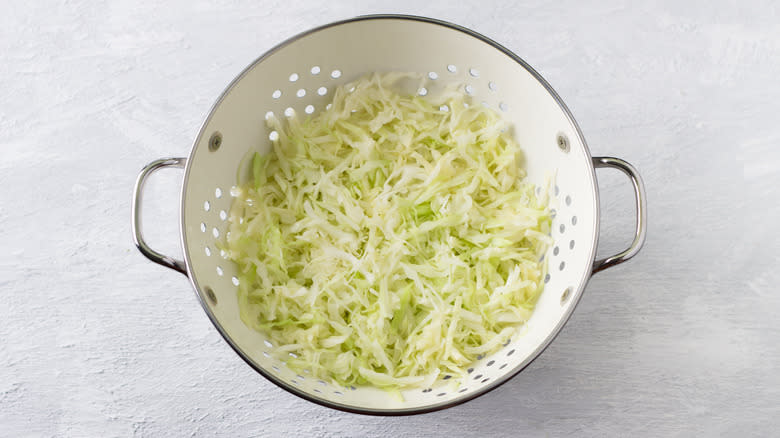Steam Cabbage Instead Of Boiling To Prevent It From Stinking Up Your Kitchen

The common cabbage, humble and unassuming, carries with it a rather unfortunate characteristic: It has the potential to fill your kitchen with a pungent, unpleasant odor during the cooking process. This often discourages many cooks from incorporating this nutritious vegetable into their meals despite its wealth of nutritional benefits, including vitamins C and K, as well as fiber and antioxidants. However, there is a practical approach to bypass this issue, enabling us to enjoy cooking with cabbage without the accompanying olfactory discomfort — steaming instead of boiling.
When cabbage is boiled, the high temperature causes it to release sulfur compounds into the air, resulting in a strong off-putting smell. Steaming, on the other hand, cooks the cabbage more gently and uses less water, preventing the sulfur compounds from becoming as volatile and permeating the air as intensely. Additionally, steaming cabbage helps retain more of its nutrients, as fewer vitamins and minerals are lost compared with boiling. This method also keeps the cabbage crispier and maintains its vibrant color, enhancing its overall appeal in your meals.
Read more: 23 Types Of Potatoes And When To Use Them
Other Ways To Reduce The Odor When Cooking Cabbage

If you really prefer boiling your cabbage, the way to reduce the resulting odor is to avoid the common mistake of over-boiling it. Cooking it for a shorter time can help reduce the release of sulfur compounds, hence lessening the smell. Otherwise, exploring other cooking methods like stir-frying or grilling can also be advantageous. Incorporating ingredients such as aromatics, herbs, and spices can significantly reduce the cabbage's pungent smell. Adding elements like garlic, onions, or bay leaves helps mask the sulfur odor, introducing more desirable scents into the kitchen. Additionally, including acidic ingredients like vinegar or lemon juice in the cooking process can also help neutralize the smell.
However, if the odor is already pervasive in your kitchen, increasing ventilation becomes crucial. Opening windows or using a vent fan helps in circulating air and dispelling the smell. Baking soda is another practical tool to manage the odor. Simply placing a bowl of baking soda in the kitchen helps absorb the unwanted smell, leaving the environment fresher. By applying these tips, you can make the process of cooking cabbage less daunting and more enjoyable, maintaining a pleasant atmosphere in your kitchen.
Read the original article on Tasting Table.


